Frontline Heroes
A U.S.-based alumna reflects on what it's like to be a health care professional during the pandemic.
By Yakin Ouederni
For Hanaa Ibrahim '90, heroes nowadays look very different from the ones we see in movies. Instead of capes, they're draped in white coats and scrubs, and instead of fighting off villains, they're treating and containing COVID-19. However, while they do not look the same, they share a common goal: to save lives. As many of them as possible.

Ibrahim is the director of pharmacy in Suffolk County, Long Island, New York. When the coronavirus hit the United States, New York became the epicenter of the pandemic, with more than 350,000 confirmed cases and over 40,000 in her county. Ibrahim -- whose responsibilities as pharmacy director include overseeing the Suffolk County central pharmacy, medical programs in two jails and vaccination programs for uninsured residents -- saw her duties expand with the rapid spread of the virus.
"I oversee the distribution of testing kits to the nursing homes, fire departments and other centers so they can test the public," she said. "We also created PODs, Points of Distribution, where we create sort of a mobile hospital to draw blood and test. We're also taking care of tracing patients and all those they had been in contact with in the past 14 days and possibly have been exposed to the virus."
Ibrahim is playing a large role in the county's coronavirus public health response. Her days are filled with meetings, site visits, emergency preparedness, tracking cases and ensuring people are properly tested and traced. When a vaccination for coronavirus becomes available, she will be in charge of the vaccination program in the county.
"The efforts played out beautifully," she said about the county's public health initiative. "We flattened the curve. Had we not flattened it, we would have been worse than Italy."
But that doesn't mean it's over. As the United States began reopening the economy, states have started to see a rise in the number of cases. And more recently, the country is witnessing a wave of public gatherings as people take to the streets to protest police brutality.
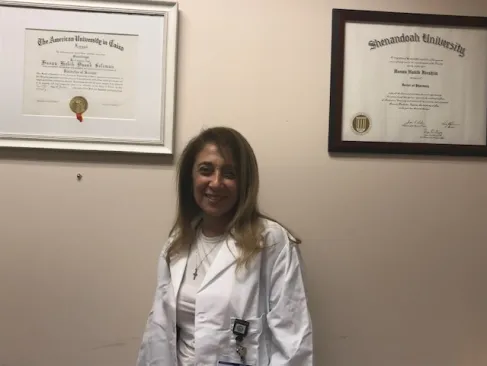
"How is this going to translate pandemically? I don't know," Ibrahim said. "It's like a perfect storm."
For now, Ibrahim and her colleagues have put together policies and procedures for all possible scenarios. "We have a plan A, plan B and plan C," she said. "It's emergency preparedness -- all 'what if' situations."
Thinking ahead is nothing new for Ibrahim. In 2008, she was the first in New York to introduce the practice of Emergency Room Pharmacists, now a common -- and deemed critical -- practice across the country. She was met with skepticism when proposing this idea but went on to become a health care pioneer in the state.
"I believed in what I was doing," she reflected. "In your job, don't look under your feet; look 10 years from now. The world 50 years ago is nothing like the world today. If you think your job is going to stay the same your whole life, you'll probably lose it."
And it's with that same mentality that she puts on her cape each morning, saying goodbye to her family as she and thousands of other health care workers go to the frontline. She says that she's tired and exhausted, and the slightest things have started to make her cry, but that doesn't stop her from heading to her office. If anything, it has made her stronger.
"Every day is a challenge, but every day is also a success story and milestone," she said. "I appreciate my family more, my friends more, my lifestyle and my religion even more now."
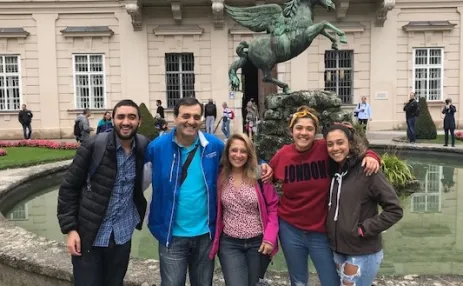 Ibrahim and her family
Ibrahim and her familyWhile Ibrahim is dedicated to doing her job, she wants everyone else to do theirs too. For now, she advises people to keep their social distance, wear masks, be conscious and not take the matter as a joke. For the future, she wants governments worldwide to be transparent and work together when fighting the same battle.
"What hit China hit the rest of the world in one month and a half," she said. "We're going to have more pandemics in time. When that happens, countries shouldn't point fingers. They should learn from each other's mistakes and think globally."
Even as Ibrahim's career progressed since graduating from AUC with a bachelor's in chemistry in 1990, followed by a bachelor's in pharmacy from St. John's University and a doctorate in clinical pharmacy from Shenandoah University, she says that AUC has been with her every step of the way. It's at AUC, she affirmed, where she was taught to think critically and solve problems creatively.
 Ibrahim was a ballerina during her time at AUC
Ibrahim was a ballerina during her time at AUC"Thank you, AUC, for everything you've done for me," she said. "Where I am now is all a product of AUC. It's not an institution; it's a culture and a family that taught me how to think."
And it's as an AUCian, "heart and soul," she asserted, that she will continue to fight for people's lives.

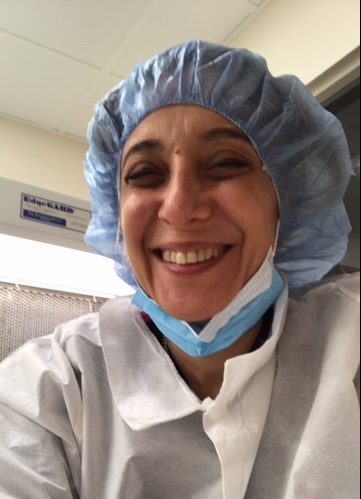
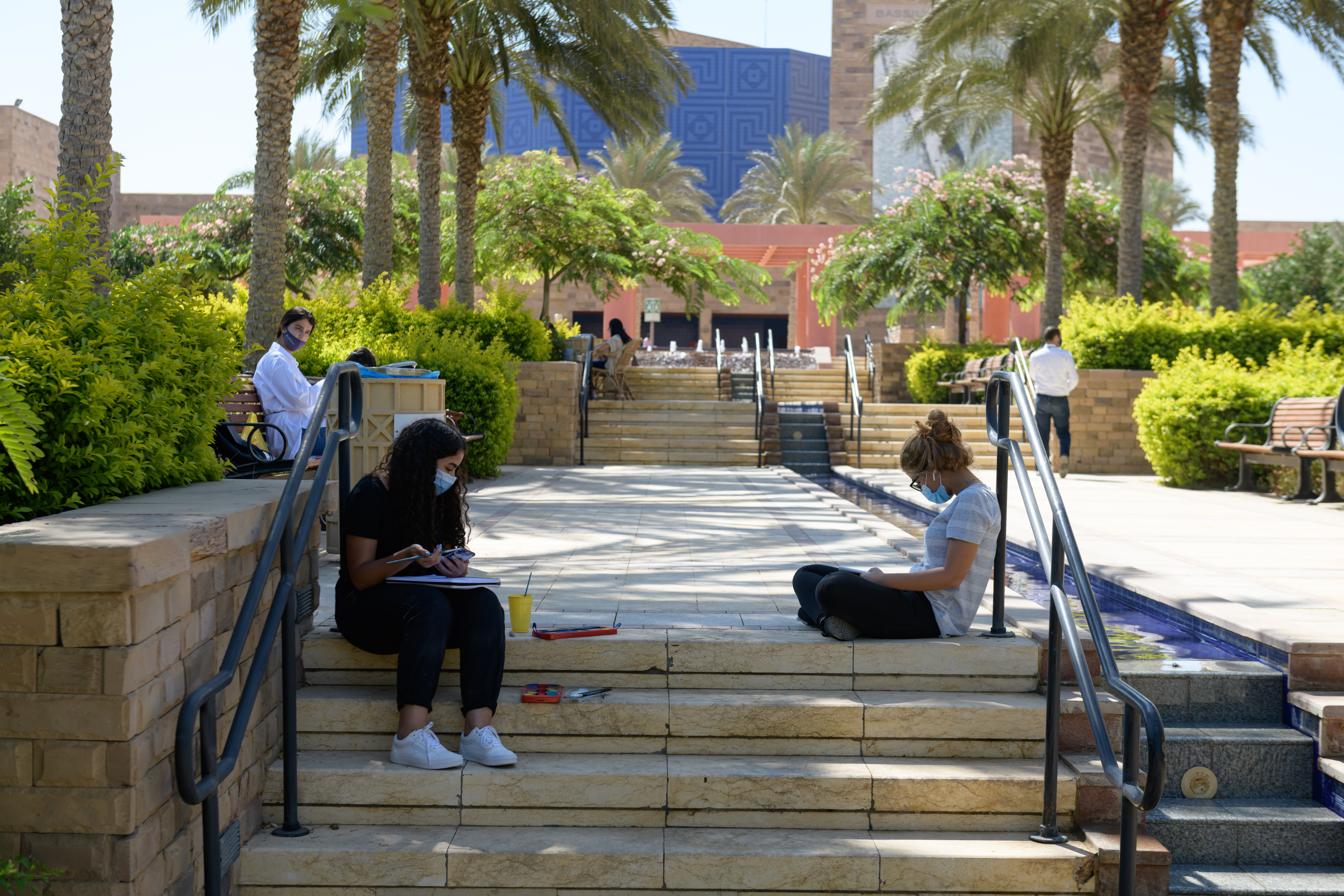
 Elbow tapping has become a common form of greeting during the pandemic
Elbow tapping has become a common form of greeting during the pandemic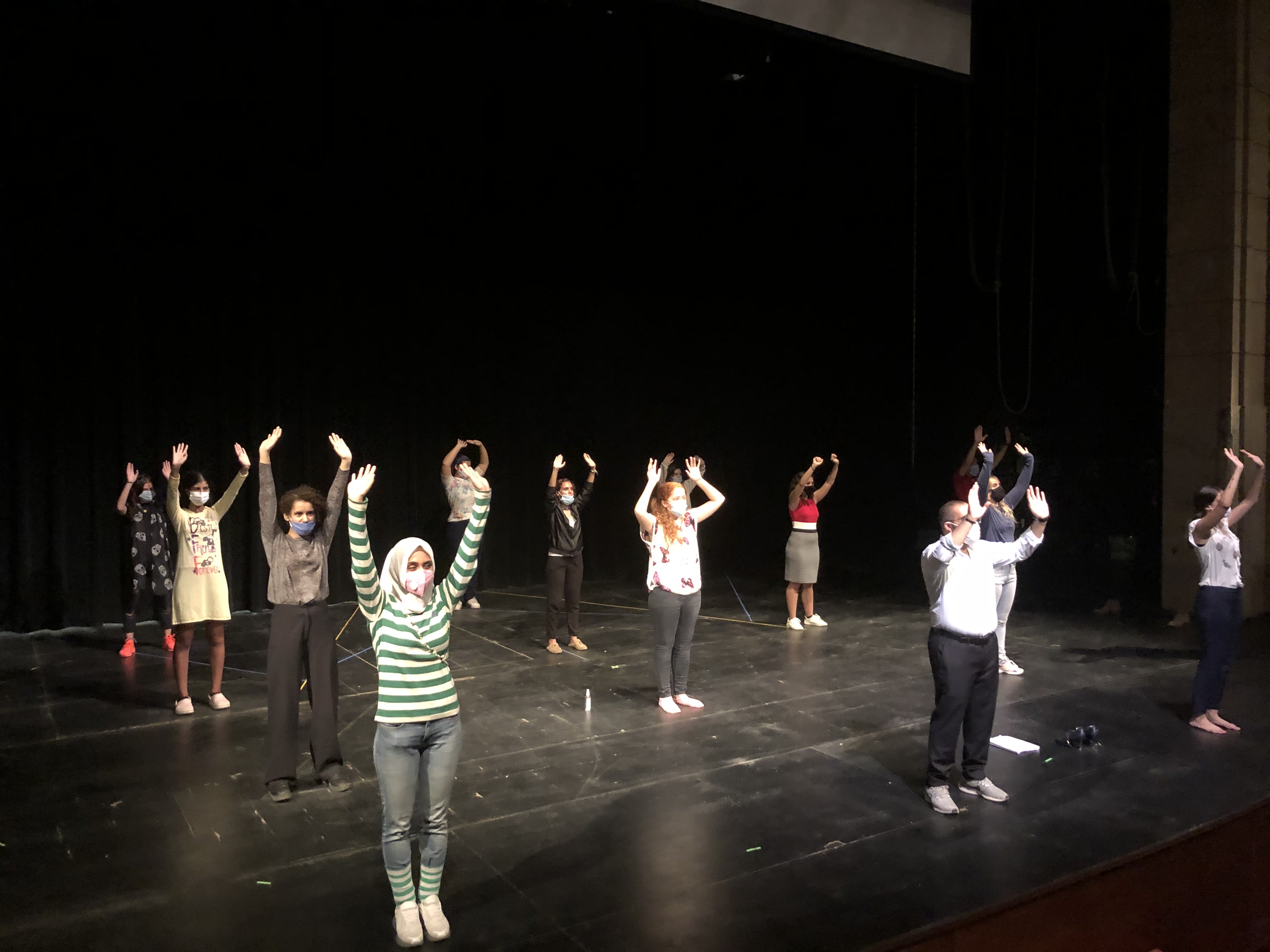
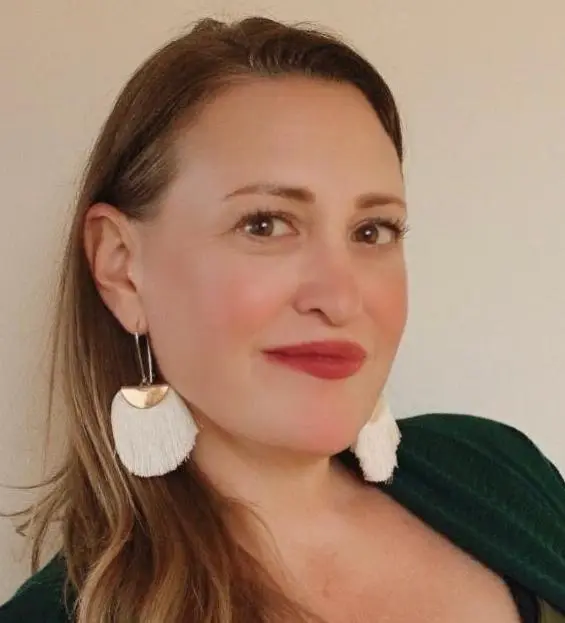
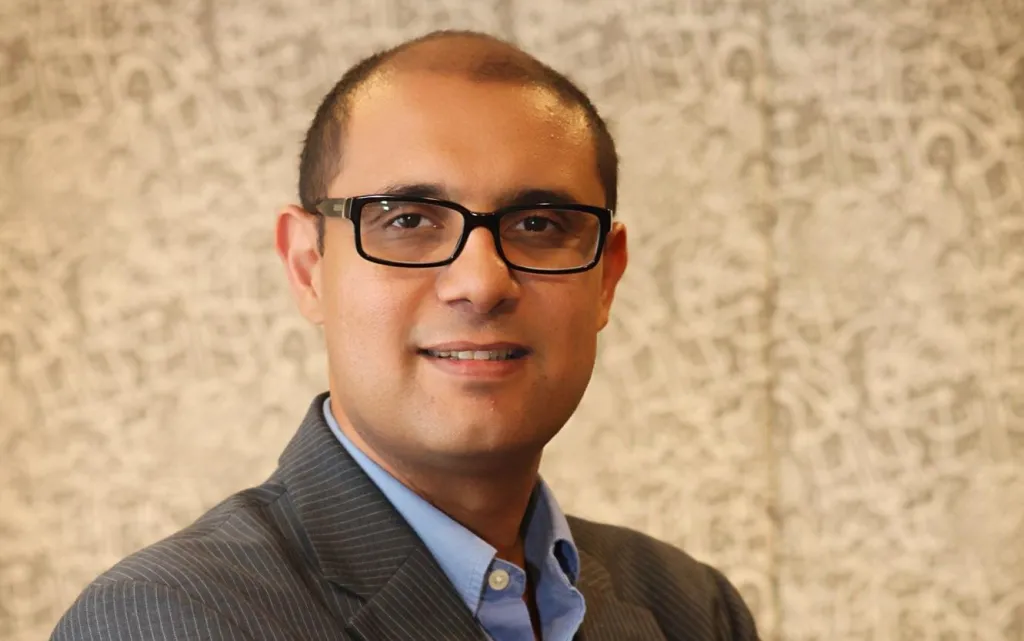
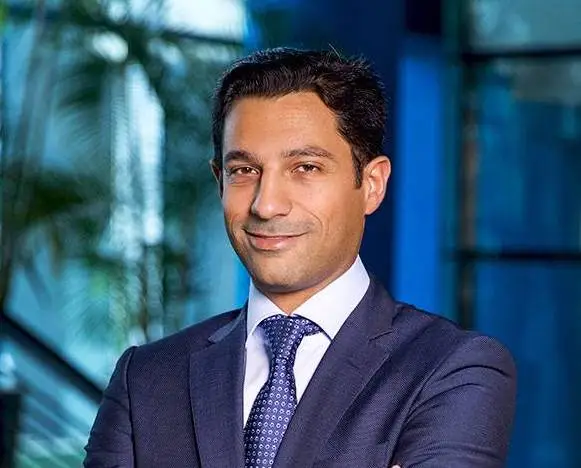


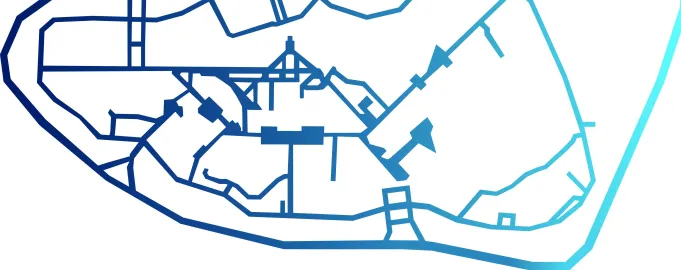
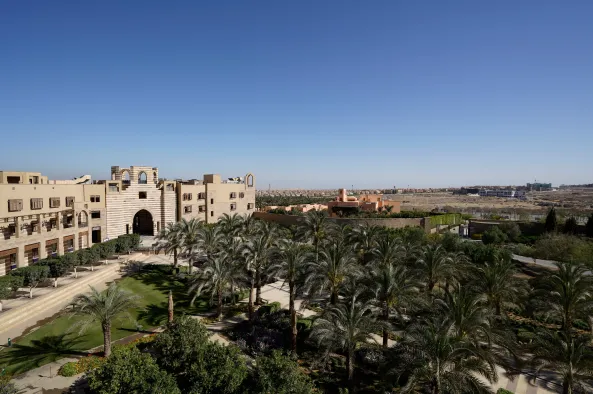
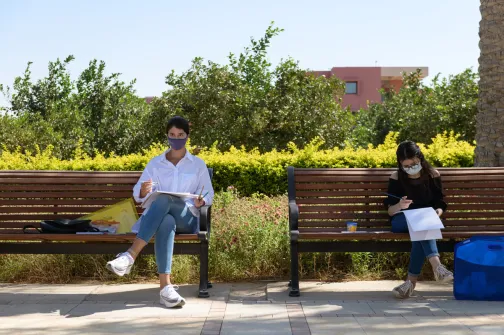 Outdoor classes might become a norm in the post-COVID world
Outdoor classes might become a norm in the post-COVID world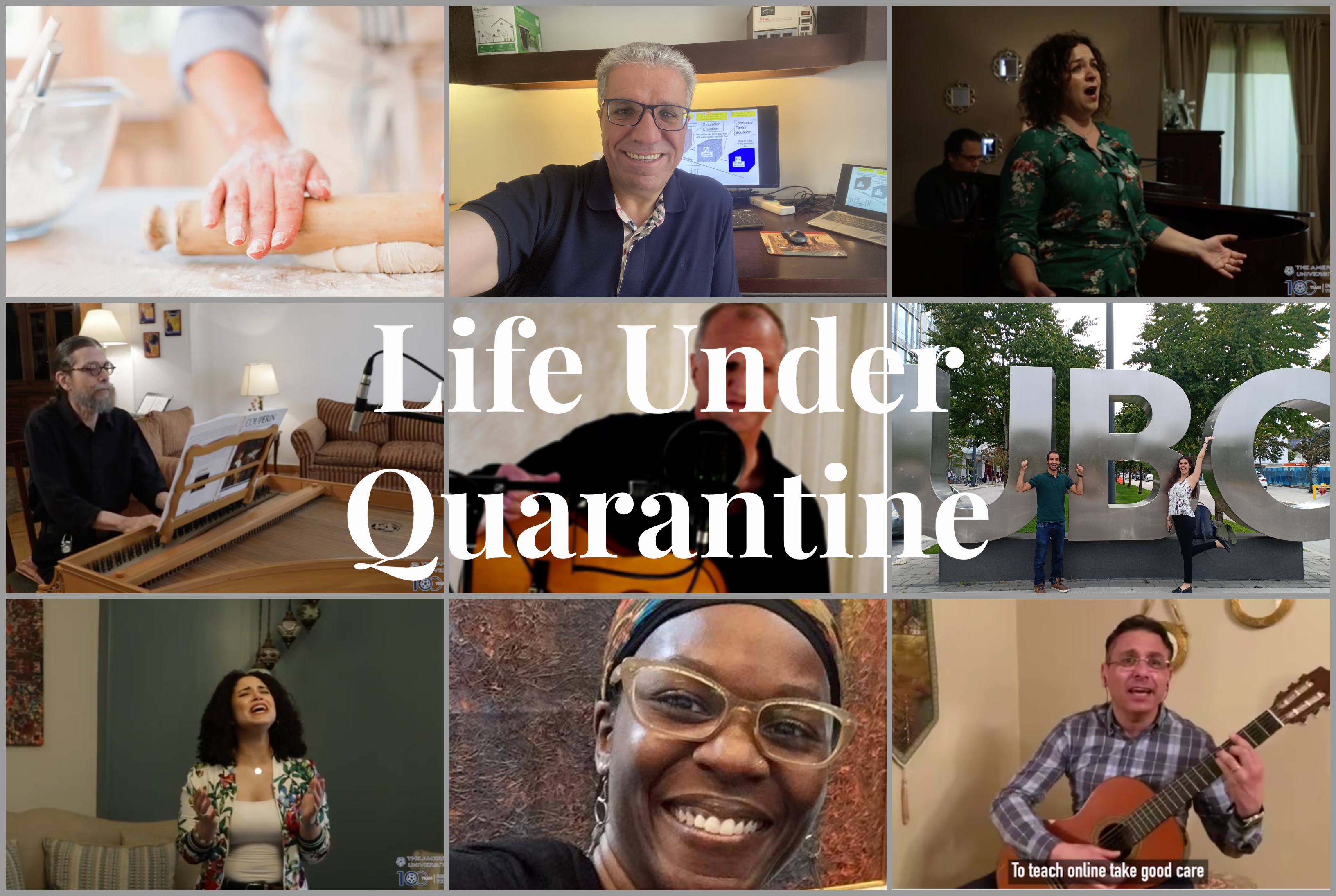
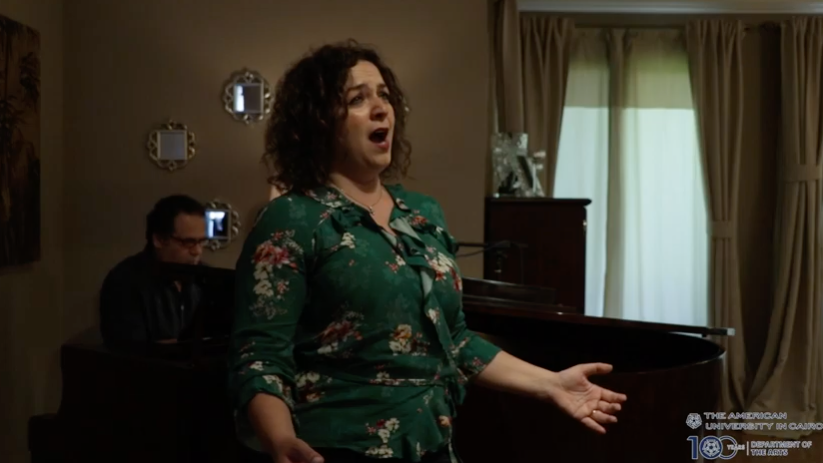 Dina Iskander, adjunct professor of voice and founder and director of the AUC Opera Ensemble, sings a Broadway tune and a tribute to David Llewellyn Hales (1957-2020), a musician, accompanist and coach who worked with students and ensembles at AUC, and as a reminder to stay strong during these challenging times.
Dina Iskander, adjunct professor of voice and founder and director of the AUC Opera Ensemble, sings a Broadway tune and a tribute to David Llewellyn Hales (1957-2020), a musician, accompanist and coach who worked with students and ensembles at AUC, and as a reminder to stay strong during these challenging times.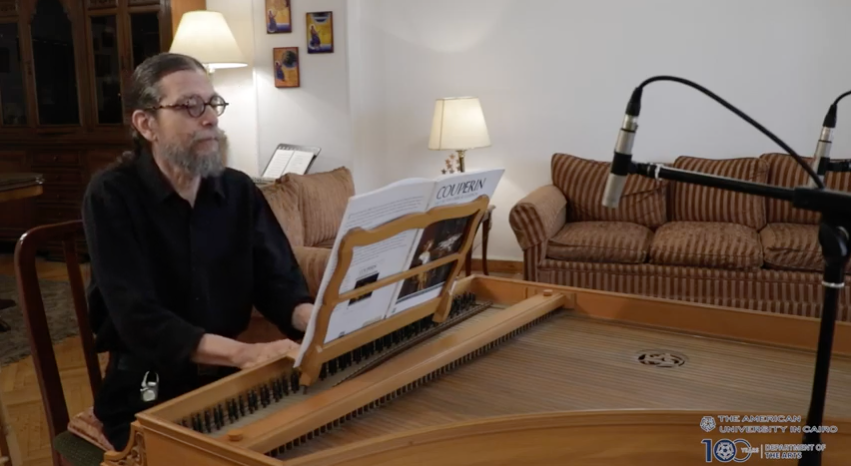 John Baboukis, professor and director of AUC's music program, initiated This is Not a Concert series to provide "musical comfort food" during the quarantine
John Baboukis, professor and director of AUC's music program, initiated This is Not a Concert series to provide "musical comfort food" during the quarantine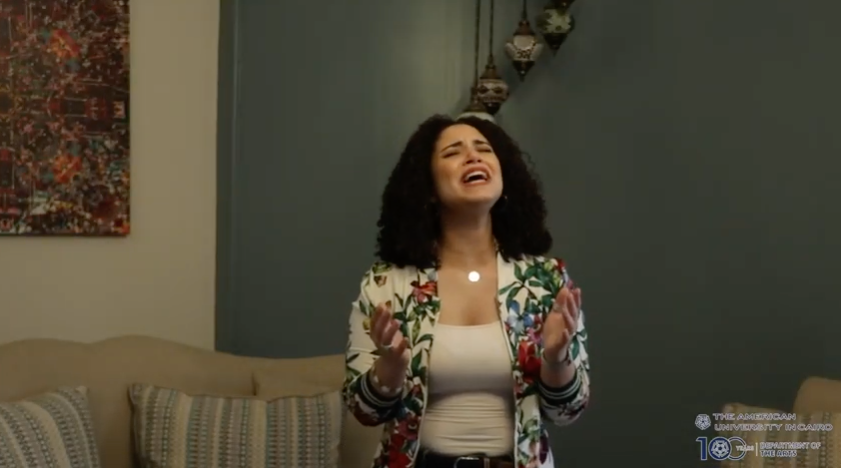 Nesma Mahgoub '13, adjunct professor of voice at AUC, founder and director of A caPop choir and professional singer, sings Rise Up and I Dreamed a Dream from Les Miserables.
Nesma Mahgoub '13, adjunct professor of voice at AUC, founder and director of A caPop choir and professional singer, sings Rise Up and I Dreamed a Dream from Les Miserables.


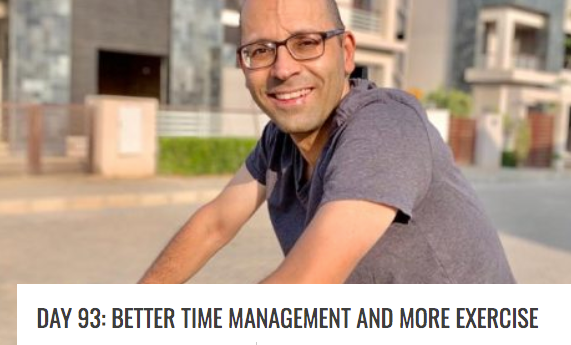

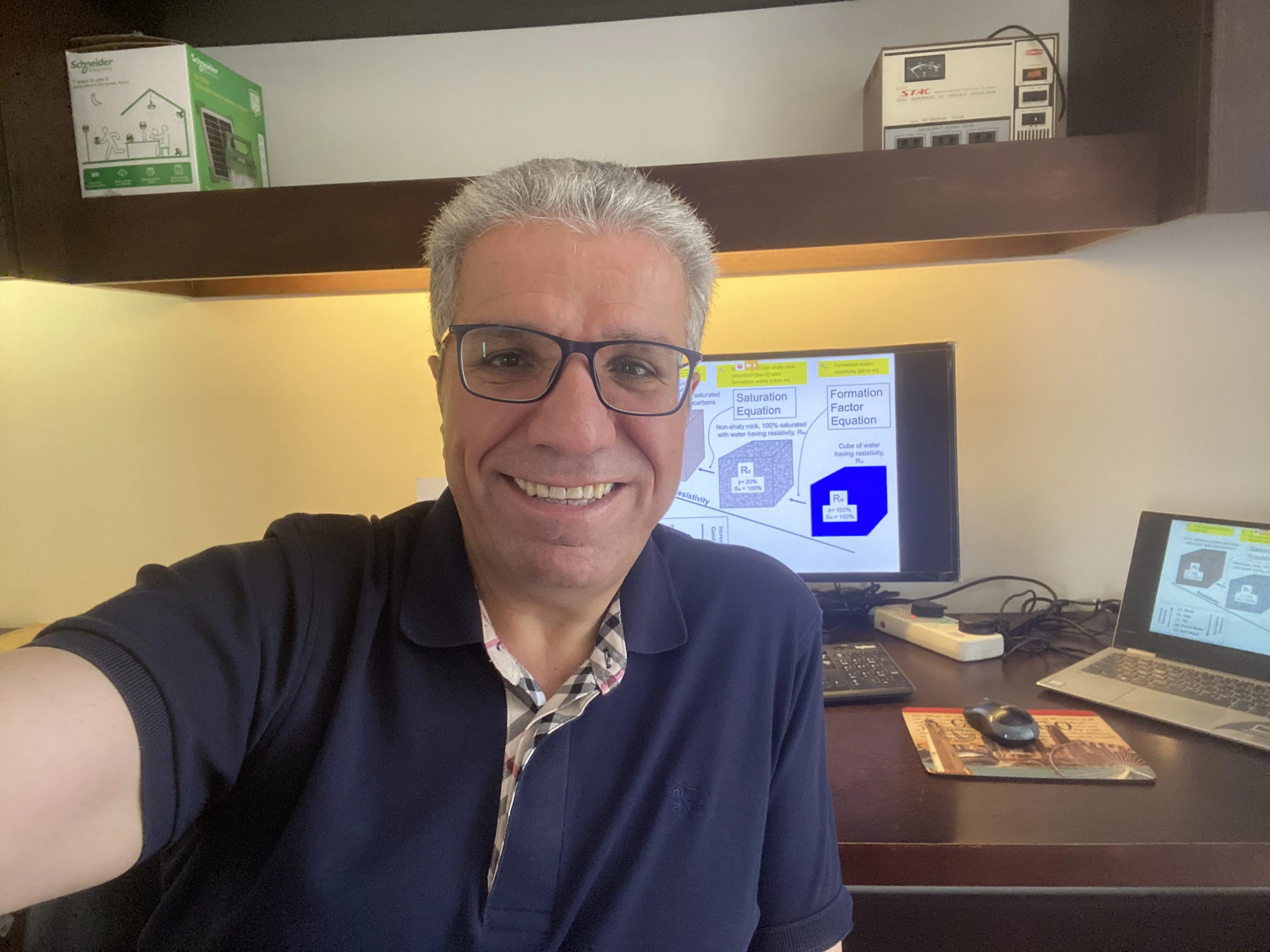 "I am really delighted to be able to interact with my students and keep them going right from the first week of online teaching. Delivering the lectures during scheduled class time, using Blackboard Collaborate Ultra, allows students to be interactive by participating in real-time questionand-answer sessions." -- Abdelaziz Khlaifat, professor, Department of Petroleum and Energy Engineering
"I am really delighted to be able to interact with my students and keep them going right from the first week of online teaching. Delivering the lectures during scheduled class time, using Blackboard Collaborate Ultra, allows students to be interactive by participating in real-time questionand-answer sessions." -- Abdelaziz Khlaifat, professor, Department of Petroleum and Energy Engineering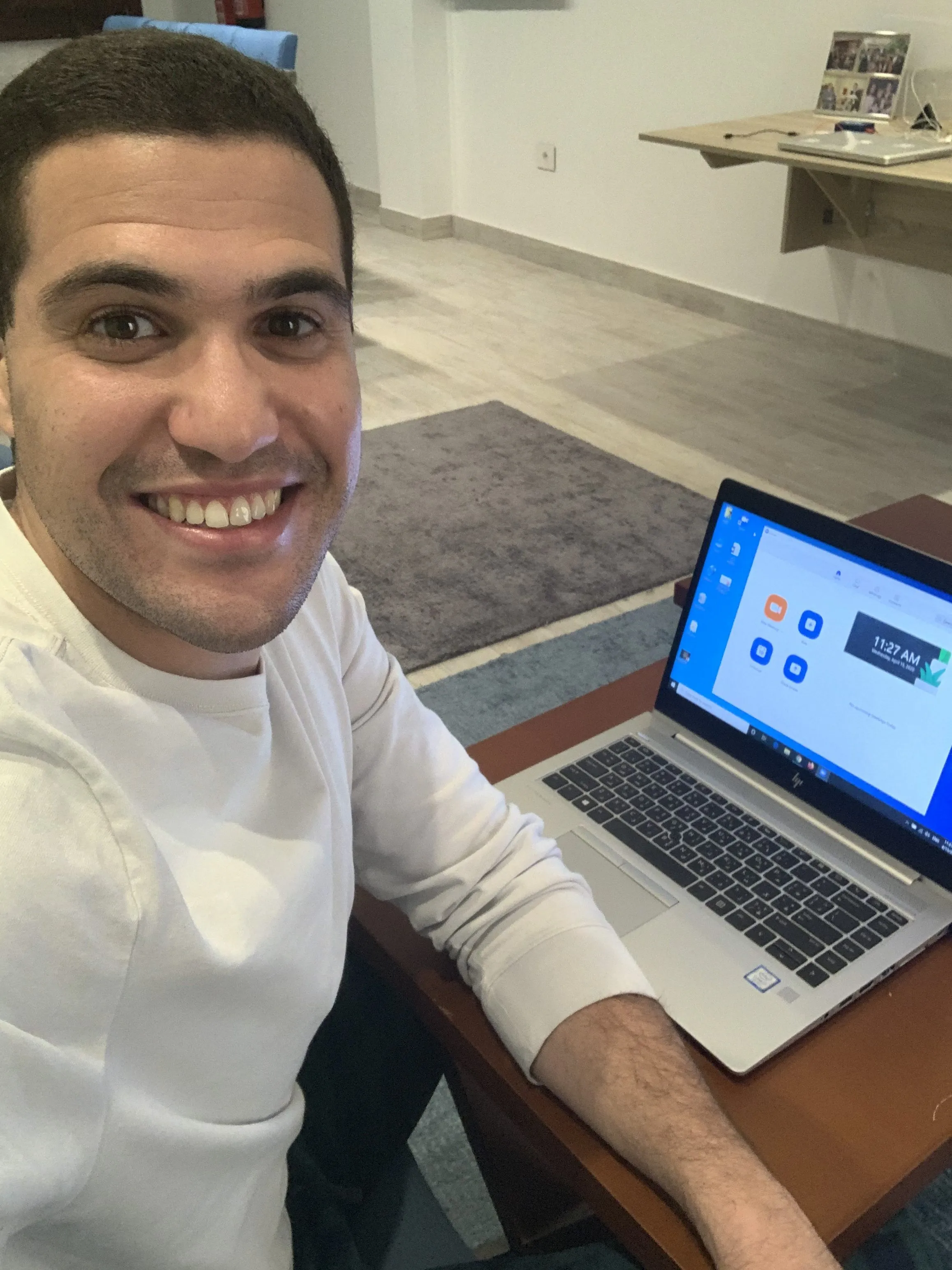 "The transition to online teaching has been smooth. Of course, there are challenges, but according to feedback from my students, they are satisfied. These are difficult times for us all, and we all have to come together and support each other by being understanding of how the disruptions to our daily routines have affected all aspects of our lives. I am thankful for how the AUC community as a whole has been very supportive." -- Adel El Adawy, assistant professor, Middle East Studies Center
"The transition to online teaching has been smooth. Of course, there are challenges, but according to feedback from my students, they are satisfied. These are difficult times for us all, and we all have to come together and support each other by being understanding of how the disruptions to our daily routines have affected all aspects of our lives. I am thankful for how the AUC community as a whole has been very supportive." -- Adel El Adawy, assistant professor, Middle East Studies Center "We don't always get the chance to work outdoors and enjoy the sun and breeze. This is an opportunity to make the best of the current circumstances. Stay positive, stay safe and stay home!" -- Caroline Mikhail (MA '14), executive assistant to the chair, Department of Computer Science and Engineering
"We don't always get the chance to work outdoors and enjoy the sun and breeze. This is an opportunity to make the best of the current circumstances. Stay positive, stay safe and stay home!" -- Caroline Mikhail (MA '14), executive assistant to the chair, Department of Computer Science and Engineering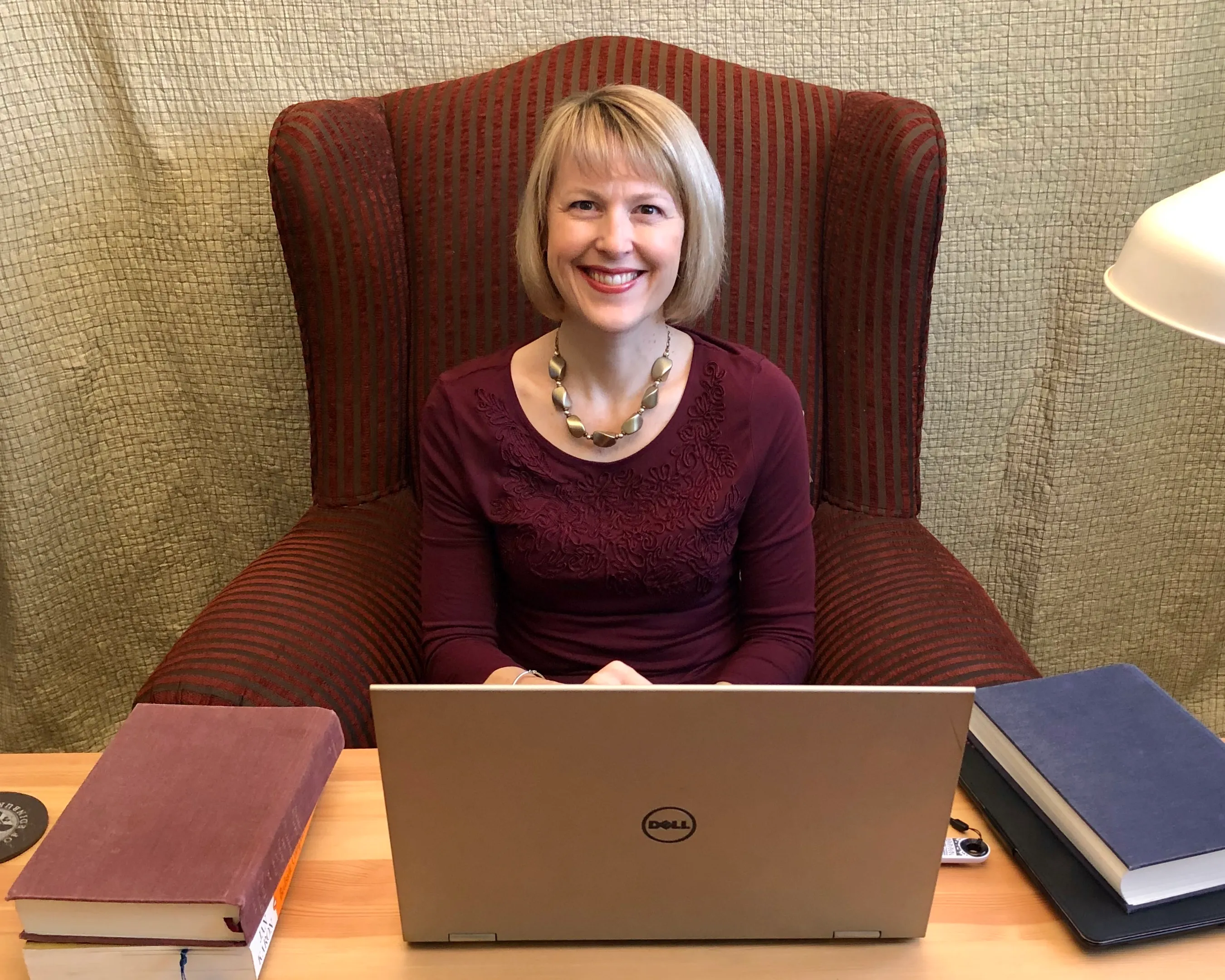 "I've discovered that making videos of my lectures is a great resource. Students tell me they like being able to rewatch any part they didn't catch the first time. I can tell from online responses that they are catching more of the content than they do taking notes in person." -- Elisabeth Kennedy, visiting assistant professor, Department of History
"I've discovered that making videos of my lectures is a great resource. Students tell me they like being able to rewatch any part they didn't catch the first time. I can tell from online responses that they are catching more of the content than they do taking notes in person." -- Elisabeth Kennedy, visiting assistant professor, Department of History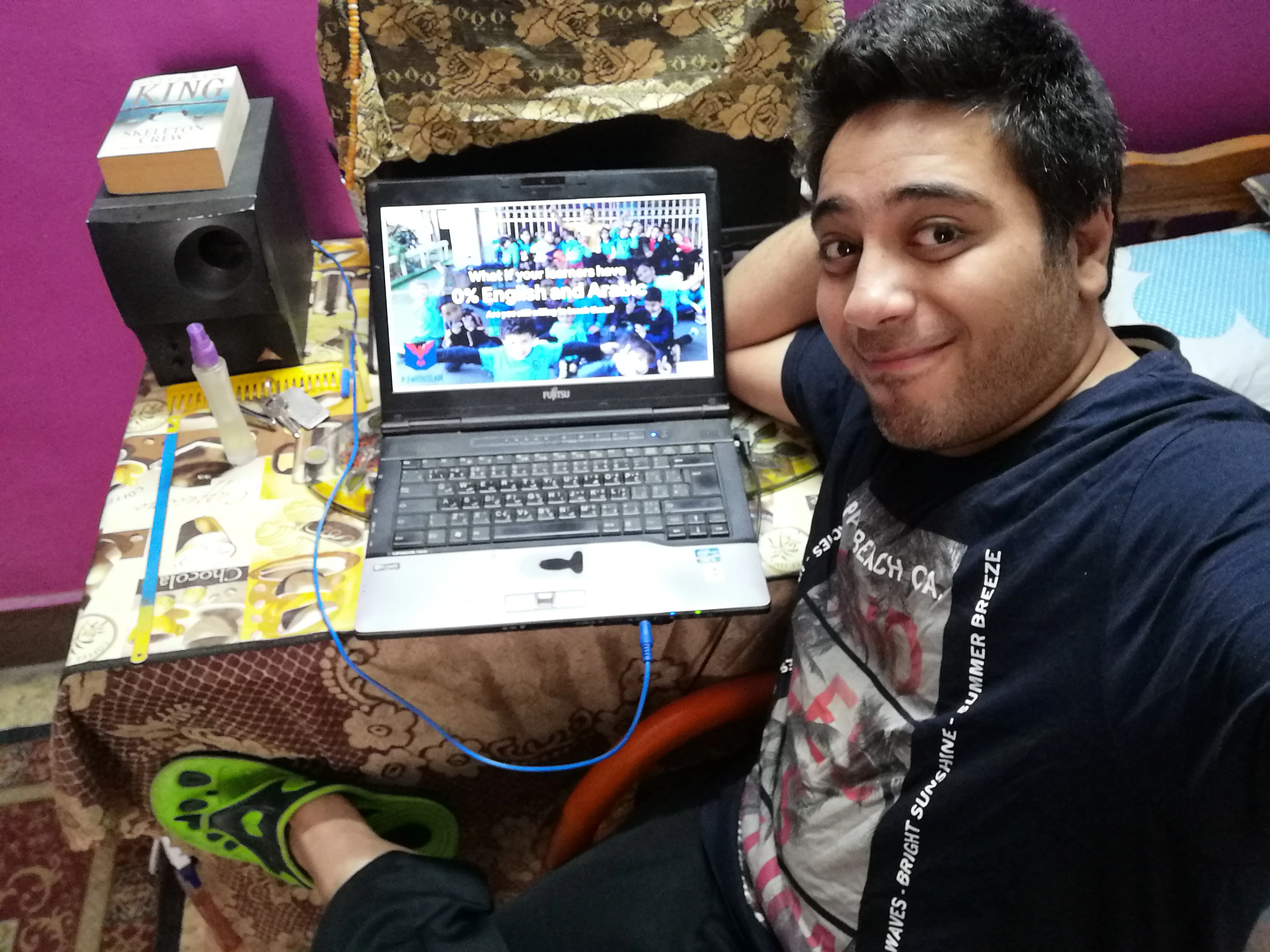 "I gave my first online presentation through Zoom in the final course for the Professional Educator Diploma, and I rocked it! Keep it up, believe in yourself and stay safe." -- Islam Ahmed, School of Continuing Education student
"I gave my first online presentation through Zoom in the final course for the Professional Educator Diploma, and I rocked it! Keep it up, believe in yourself and stay safe." -- Islam Ahmed, School of Continuing Education student "The transition to remote teaching has been an overwhelming experience. We have gained a huge amount of knowledge in a very short time, and for that, I am extremely grateful. Distant learning is full of potential that is now smoothly implemented, and we will continue benefiting from it even after these hard times are gone." -- Mariam Abouhadid, adjunct assistant professor, Department of Architecture
"The transition to remote teaching has been an overwhelming experience. We have gained a huge amount of knowledge in a very short time, and for that, I am extremely grateful. Distant learning is full of potential that is now smoothly implemented, and we will continue benefiting from it even after these hard times are gone." -- Mariam Abouhadid, adjunct assistant professor, Department of Architecture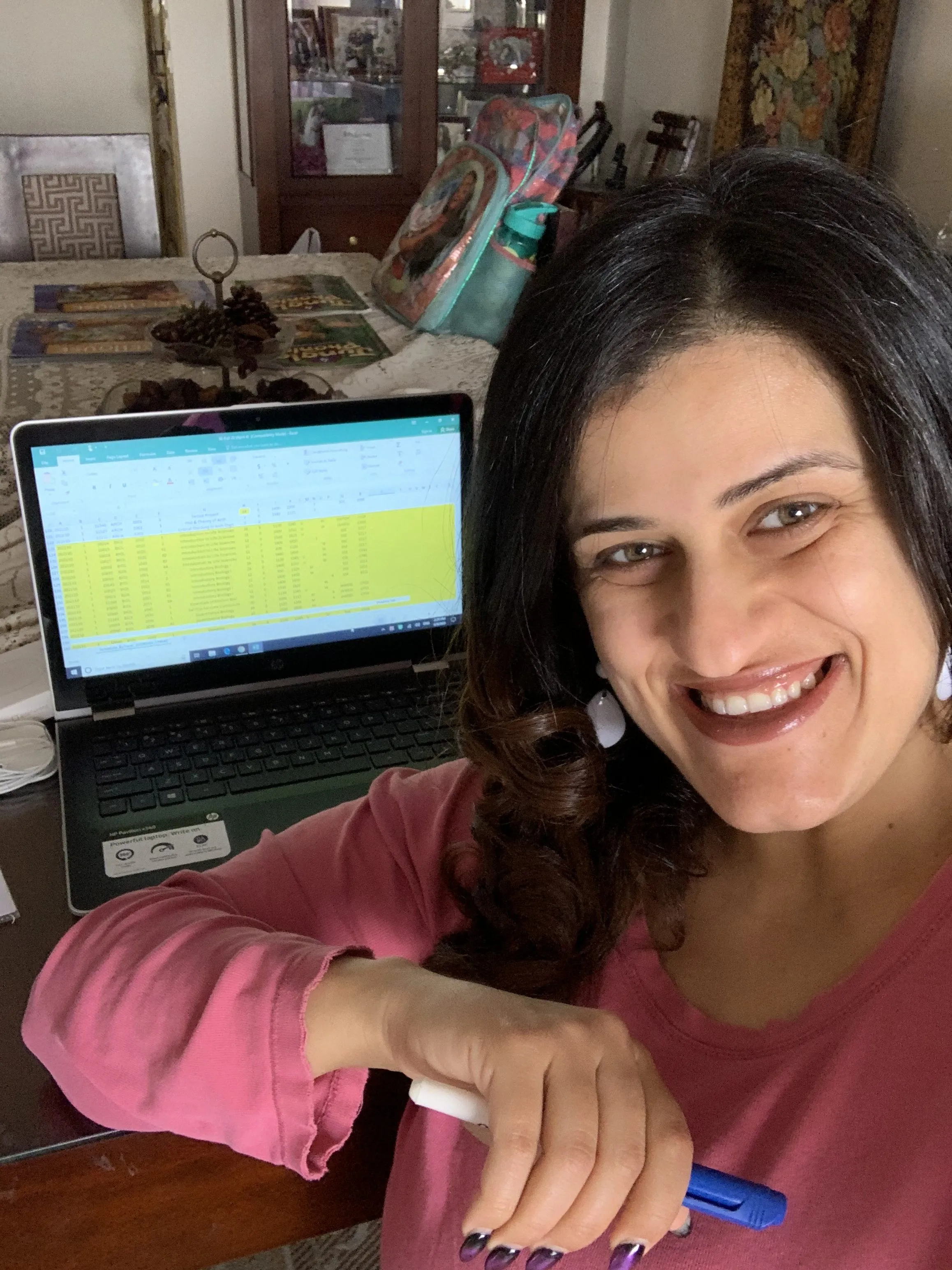 "Working from home is definitely a new challenge for me, especially while having two kids around, but during these difficult times, we all have to stay home and stay safe so we can get through this together." -- Ragya Sorour, executive assistant to the chair, Department of Biology
"Working from home is definitely a new challenge for me, especially while having two kids around, but during these difficult times, we all have to stay home and stay safe so we can get through this together." -- Ragya Sorour, executive assistant to the chair, Department of Biology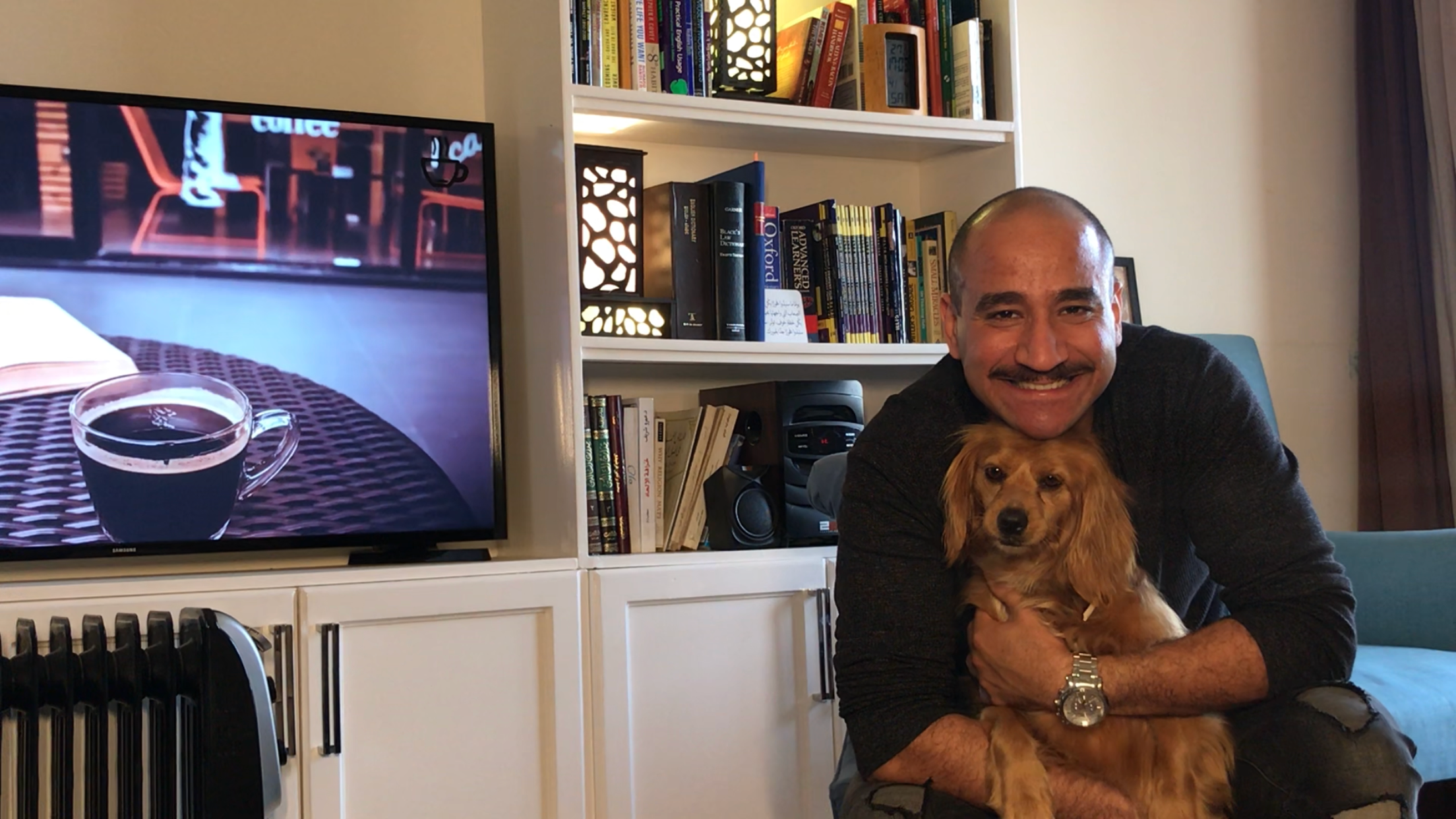 "Teaching online from home proved what I used to say to my trainees: 'Teachers will not be replaced by technology, but teachers who do not use technology will be replaced.'" -- Osama Sebaai, instructor and teacher trainer, School of Continuing Education
"Teaching online from home proved what I used to say to my trainees: 'Teachers will not be replaced by technology, but teachers who do not use technology will be replaced.'" -- Osama Sebaai, instructor and teacher trainer, School of Continuing Education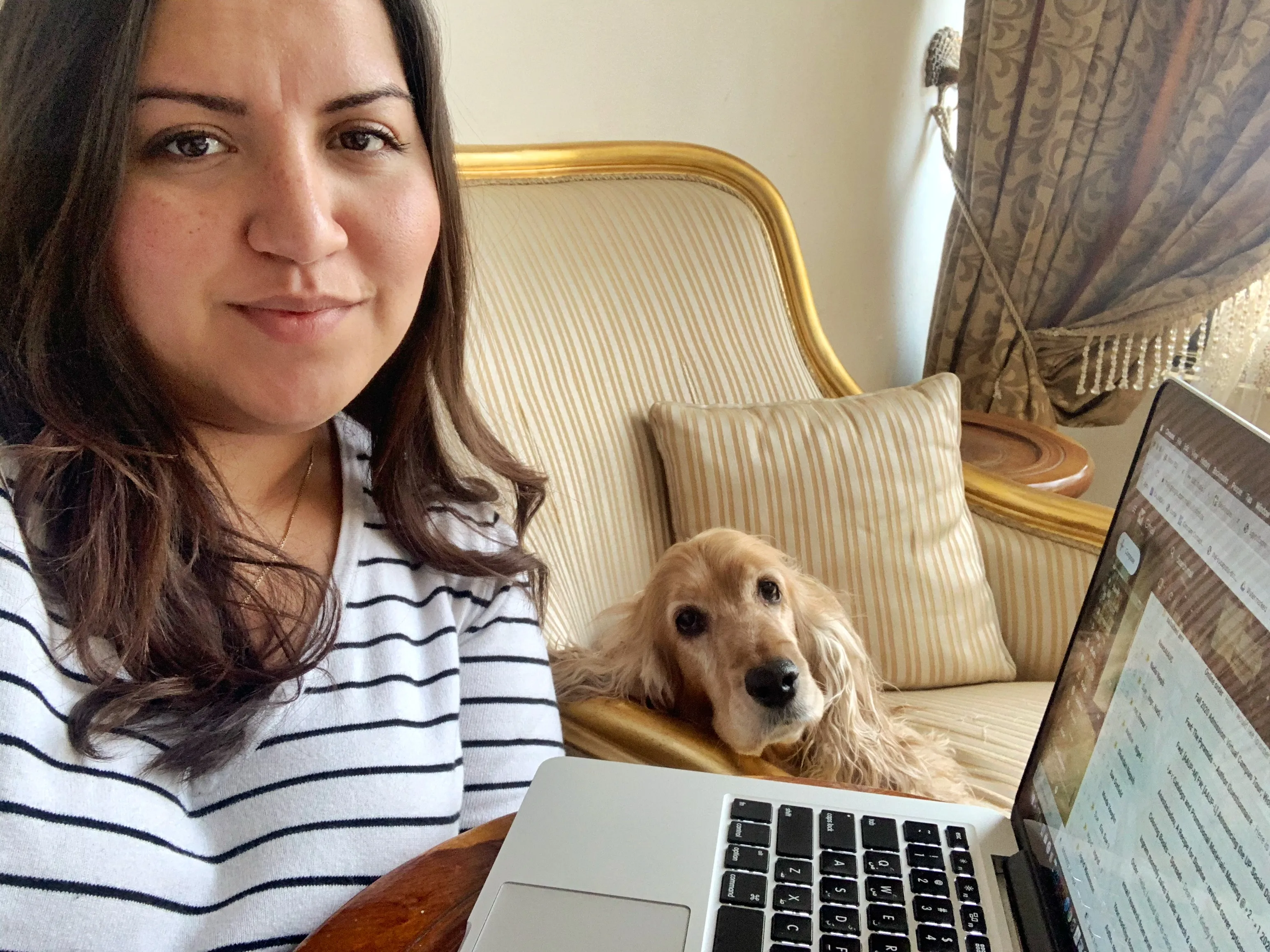 "Working remotely is sometimes challenging, but it has definitely pushed me to find creative ways to maintain productivity. It also helps when my dog is by my side in every online meeting I attend. She is my support system." -- Suzan Kenawy '09, '20, marketing manager, AUC Press and Bookstores
"Working remotely is sometimes challenging, but it has definitely pushed me to find creative ways to maintain productivity. It also helps when my dog is by my side in every online meeting I attend. She is my support system." -- Suzan Kenawy '09, '20, marketing manager, AUC Press and Bookstores "These difficult circumstances enabled me to discover how patient, kind and understanding my professors are. Thank you to all AUC staff members who work in silence in order to ease our online journey." -- Samaa Abdelhamid, AUC student
"These difficult circumstances enabled me to discover how patient, kind and understanding my professors are. Thank you to all AUC staff members who work in silence in order to ease our online journey." -- Samaa Abdelhamid, AUC student "I am the corporate financial planning and analysis manager at PepsiCo headquarters in New York. I've got some work-from-home tips for everyone: Set a daily working hours timetable to be focused, dress up to freshen up, take refresh breaks every couple of hours, stay more connected with your teammates, organize a simple workstation and motivate your family members." -- Farah Haggag '10, '12
"I am the corporate financial planning and analysis manager at PepsiCo headquarters in New York. I've got some work-from-home tips for everyone: Set a daily working hours timetable to be focused, dress up to freshen up, take refresh breaks every couple of hours, stay more connected with your teammates, organize a simple workstation and motivate your family members." -- Farah Haggag '10, '12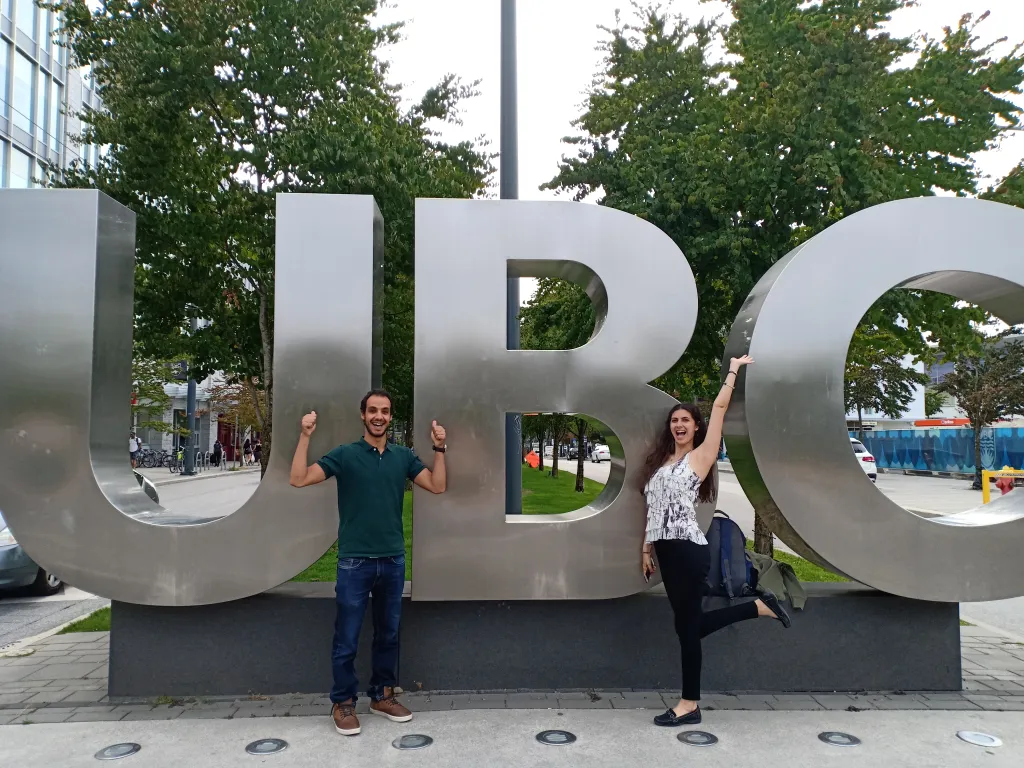 "We graduated from the architectural engineering program in 2016. We just got our master's in urban design from The University of British Columbia in Vancouver, Canada. Now we are volunteering with an advocacy group called Car Free Day to apply what we have learned during our master's program in the city." -- Islam Ibrahim El Banna '16 and Aya Khaled Abdelfatah '16
"We graduated from the architectural engineering program in 2016. We just got our master's in urban design from The University of British Columbia in Vancouver, Canada. Now we are volunteering with an advocacy group called Car Free Day to apply what we have learned during our master's program in the city." -- Islam Ibrahim El Banna '16 and Aya Khaled Abdelfatah '16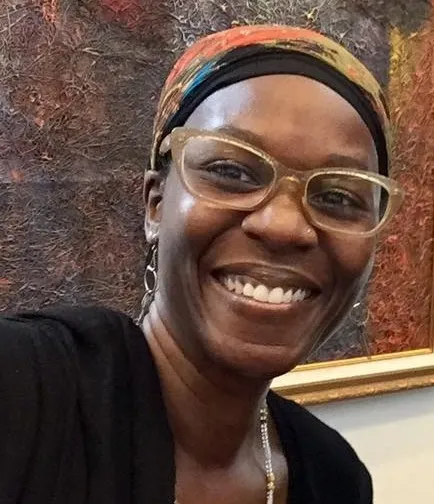 "I graduated with a master's in international human rights law and a graduate diploma in forced migration and refugee studies in 2006. I have fond memories of my schooling at AUC. I am currently teleworking in Silver Spring, Maryland, as the deputy director of the Office of Conflict Management and Mitigation with USAID. When things calm down and travel is available again, I will be working for USAID in Khartoum, Sudan, as the deputy director of Food for Peace."-- Felicia Genet (MA '06)
"I graduated with a master's in international human rights law and a graduate diploma in forced migration and refugee studies in 2006. I have fond memories of my schooling at AUC. I am currently teleworking in Silver Spring, Maryland, as the deputy director of the Office of Conflict Management and Mitigation with USAID. When things calm down and travel is available again, I will be working for USAID in Khartoum, Sudan, as the deputy director of Food for Peace."-- Felicia Genet (MA '06) "COVID-19 has hit the United Kingdom hard, and little did we know that we will be staying home. I am a program leader for Further Education and Training at Edge Hill University. COVID-19 has shown us here in Liverpool the power of people coming together. The great Arab community in Liverpool and the Arabic center's initiative to provide food and support for families are exceptional. Liverpool is one of the beautiful cities in North West England that always makes me feel like I am in Alexandria or Port Said because of its waterfront and beautiful seas. Regardless of the current situation and remote work, I feel lucky to be able to hear the birds singing in the garden and see the occasional seagulls trying to steal some food." -- Shereen Hamed Shaw '06
"COVID-19 has hit the United Kingdom hard, and little did we know that we will be staying home. I am a program leader for Further Education and Training at Edge Hill University. COVID-19 has shown us here in Liverpool the power of people coming together. The great Arab community in Liverpool and the Arabic center's initiative to provide food and support for families are exceptional. Liverpool is one of the beautiful cities in North West England that always makes me feel like I am in Alexandria or Port Said because of its waterfront and beautiful seas. Regardless of the current situation and remote work, I feel lucky to be able to hear the birds singing in the garden and see the occasional seagulls trying to steal some food." -- Shereen Hamed Shaw '06
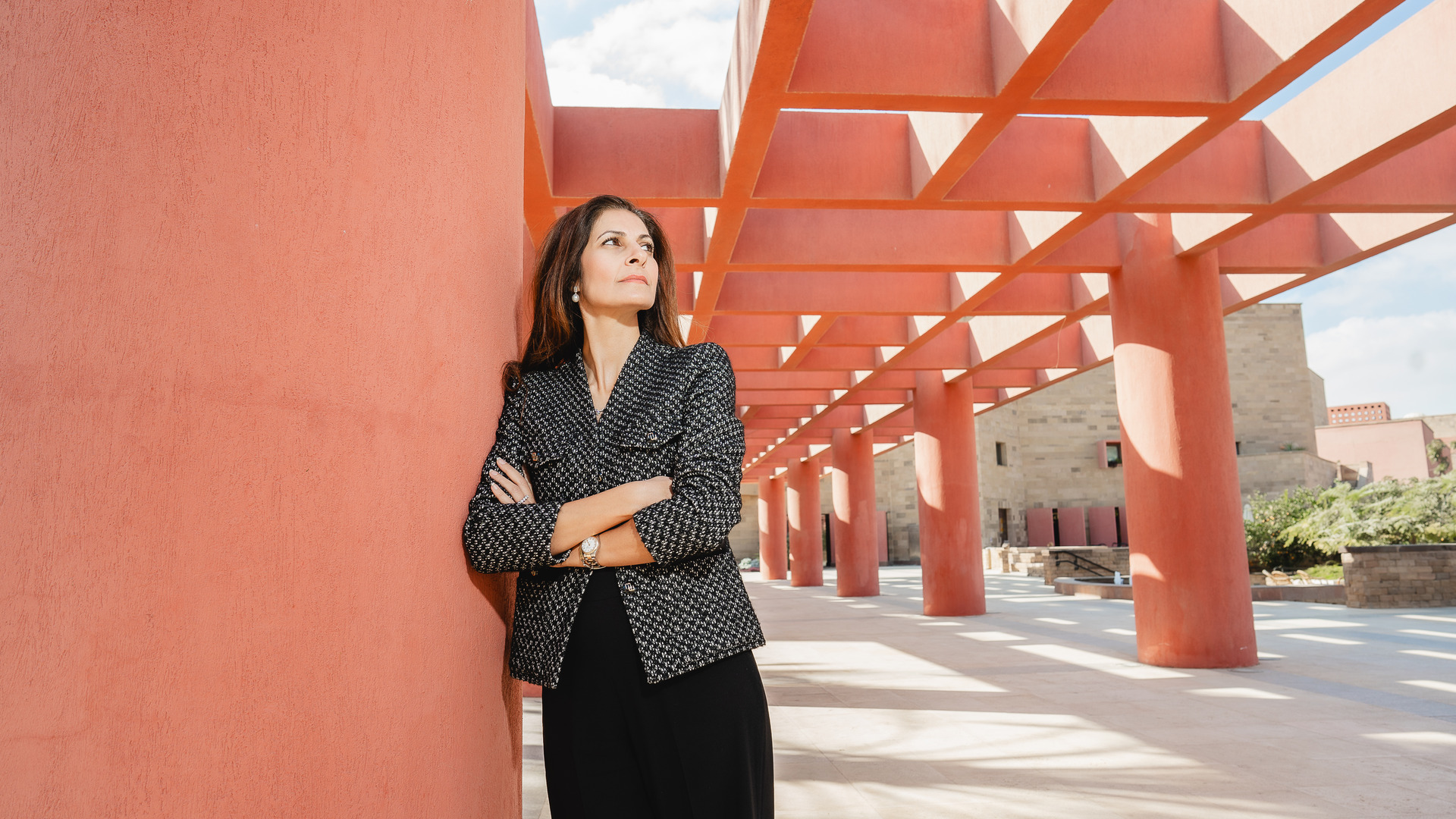
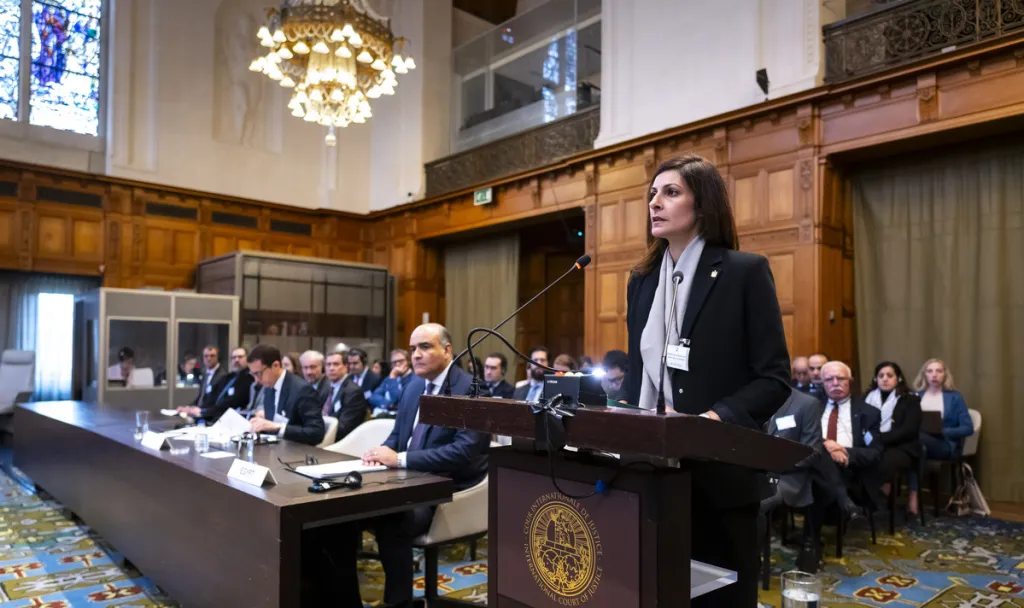 Moussa presents Egypt's oral arguments at the International Court of Justice, February 2024, photo courtesy of Jasmine Moussa
Moussa presents Egypt's oral arguments at the International Court of Justice, February 2024, photo courtesy of Jasmine Moussa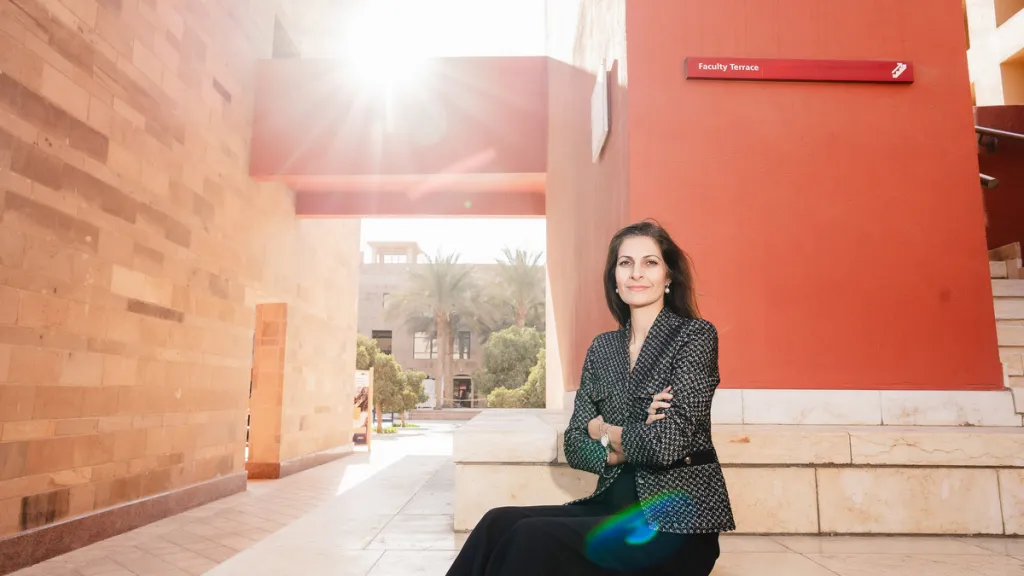 Moussa at AUC New Cairo, photo by Gihad Belasy
Moussa at AUC New Cairo, photo by Gihad Belasy
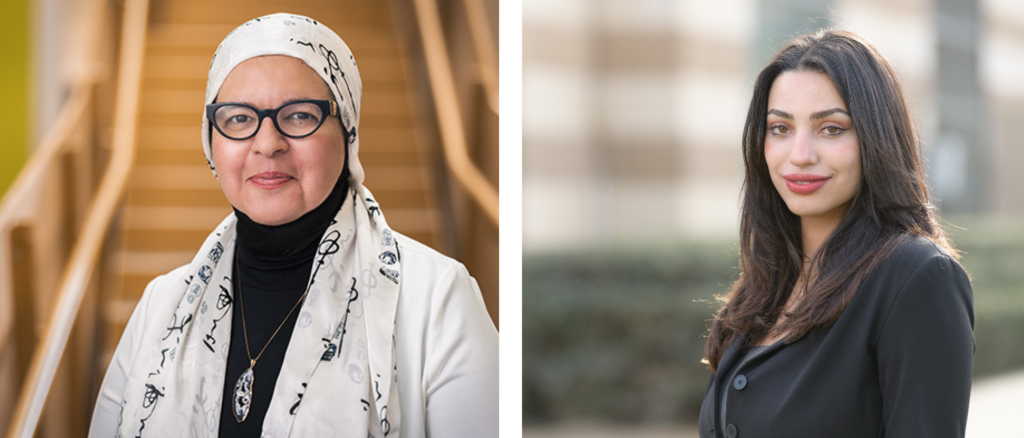 Diab and Yacoub
Diab and Yacoub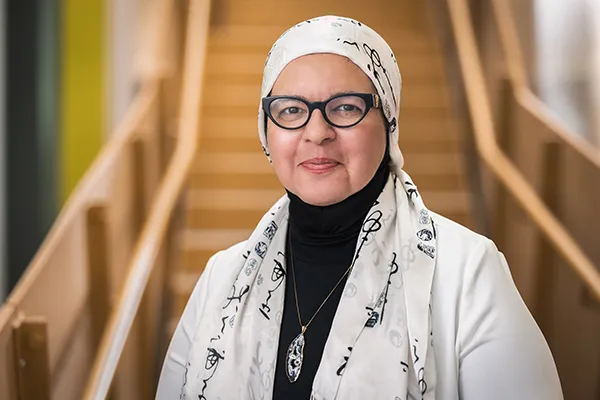
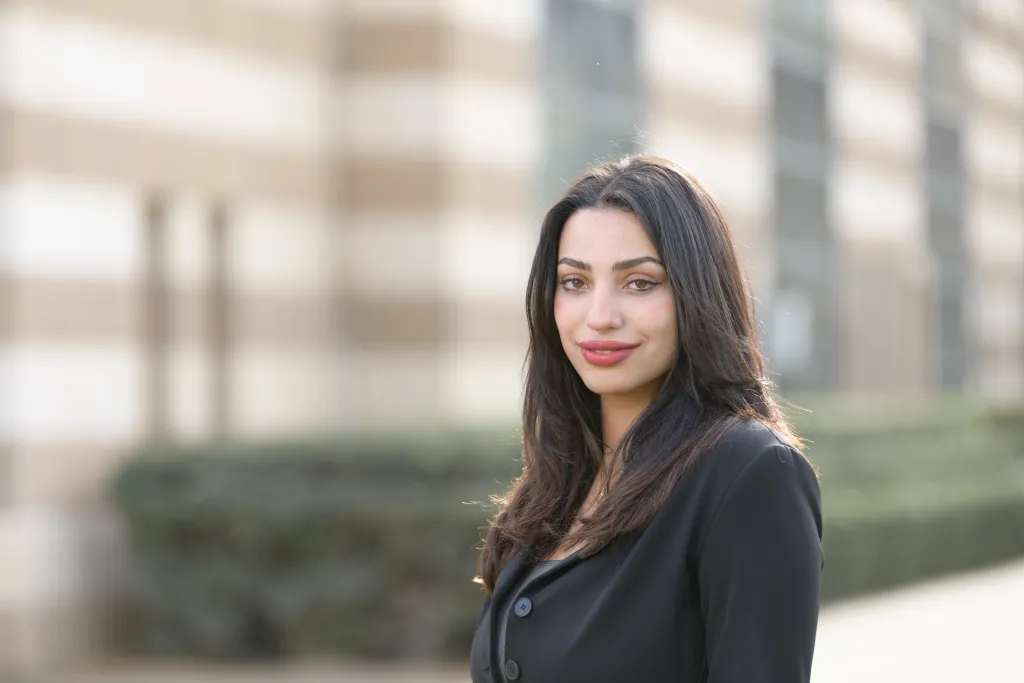
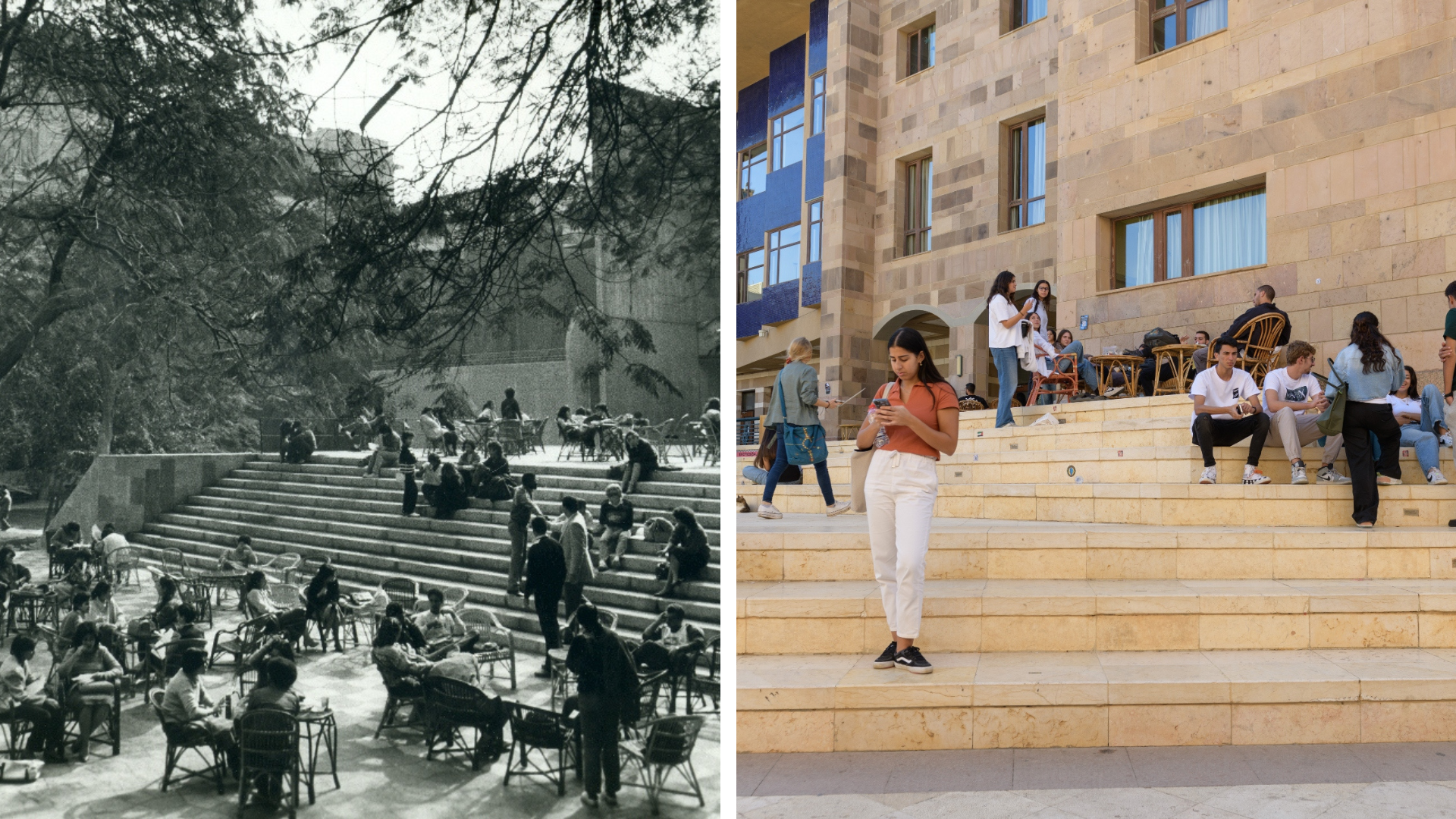
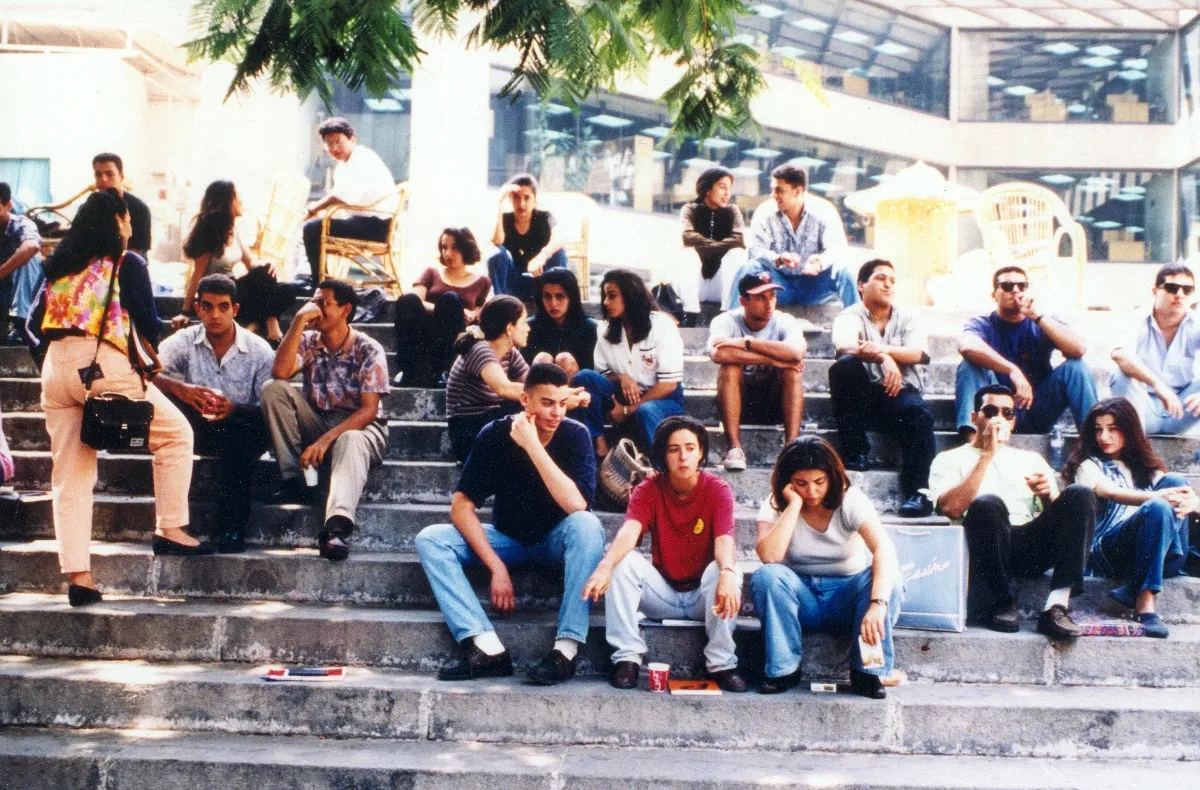 Social Science stairs on AUC's Greek Campus, 1990s-2000s. Courtesy of the University Archives
Social Science stairs on AUC's Greek Campus, 1990s-2000s. Courtesy of the University Archives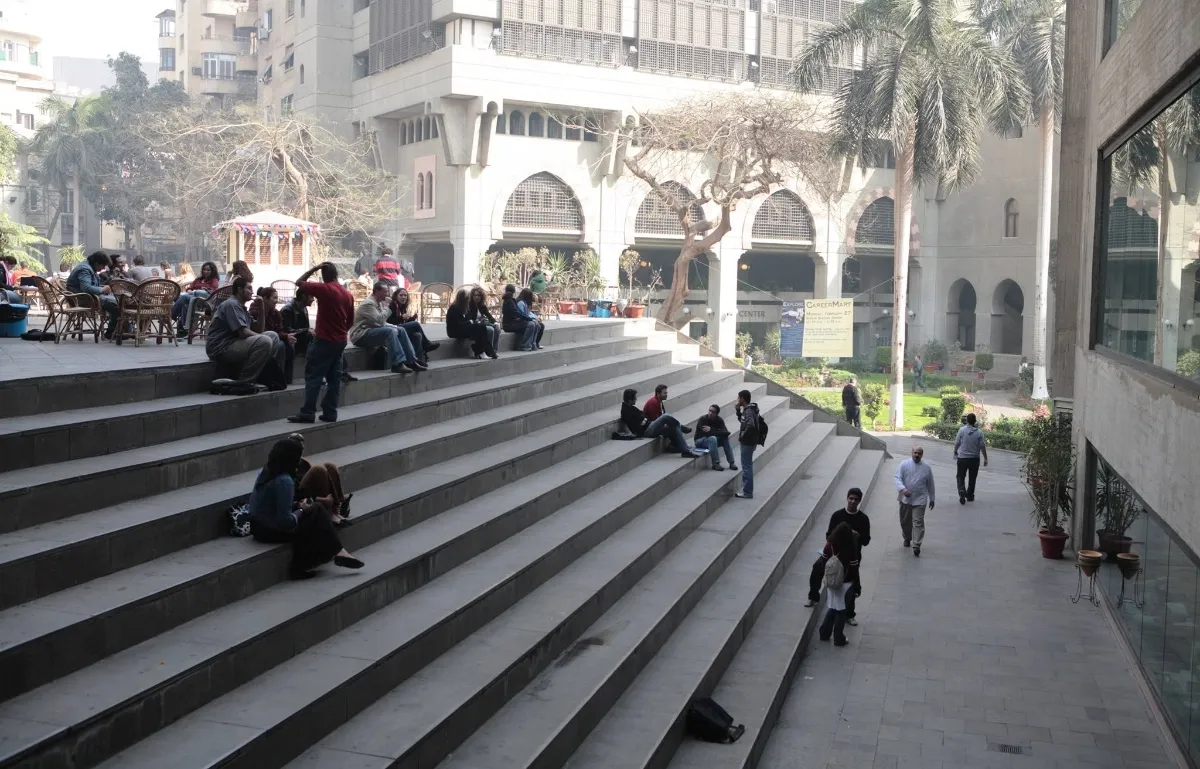 The Platform (Plat) on AUC's Greek Campus. Photo courtesy of the University Archives
The Platform (Plat) on AUC's Greek Campus. Photo courtesy of the University Archives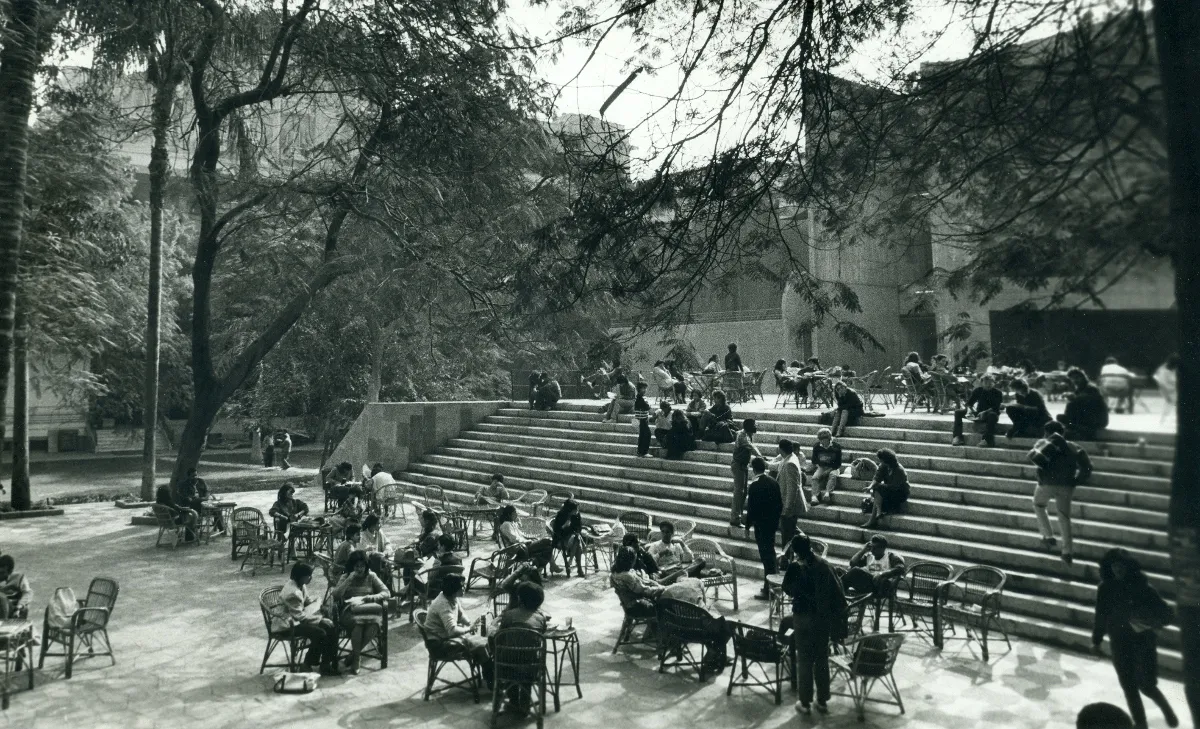 Social Science stairs on AUC's Greek Campus, 1980s. Courtesy of the University Archives
Social Science stairs on AUC's Greek Campus, 1980s. Courtesy of the University Archives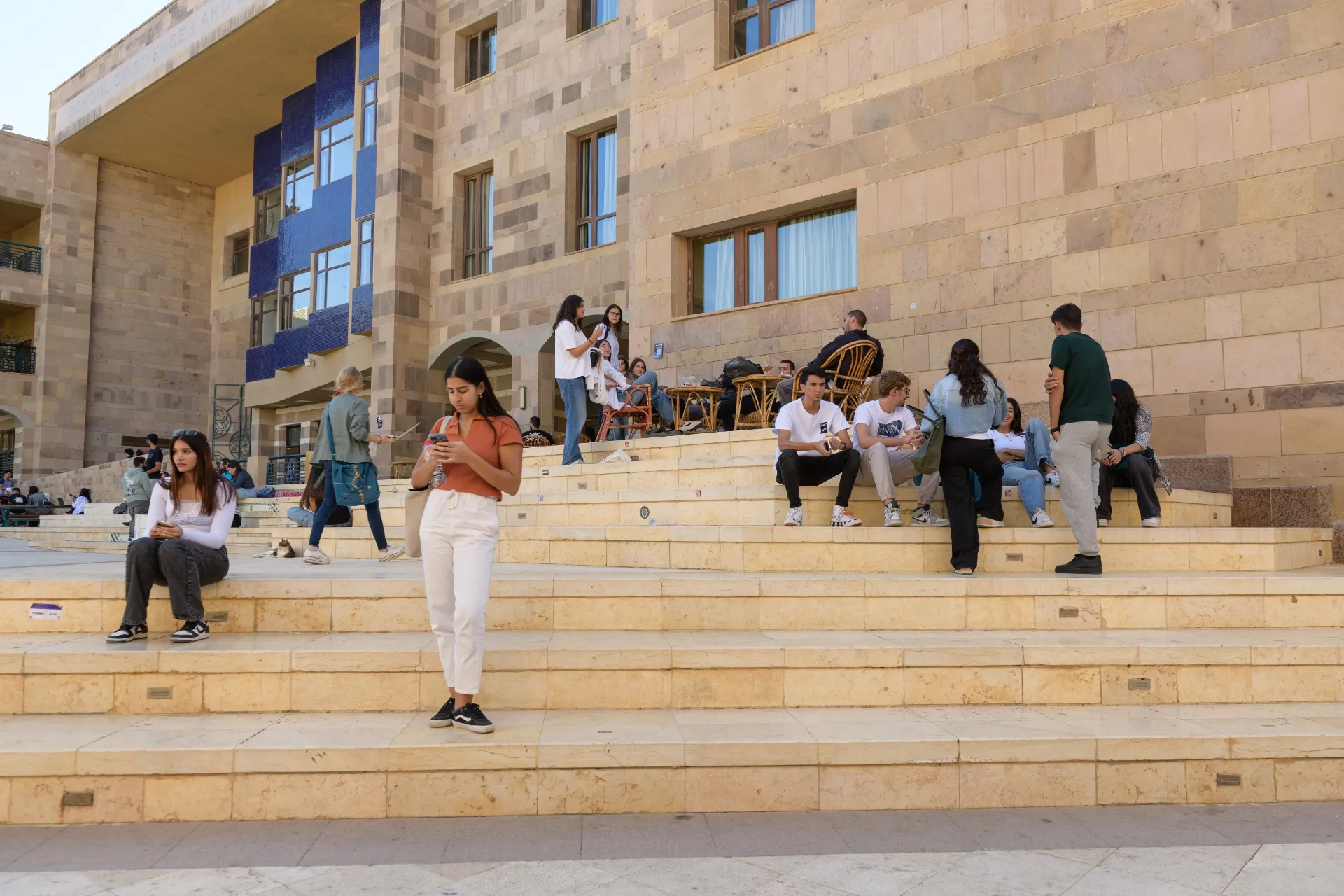 The steps in front of the School of Sciences and Engineering at AUC New Cairo. Photo by Ahmad El-Nemr
The steps in front of the School of Sciences and Engineering at AUC New Cairo. Photo by Ahmad El-Nemr